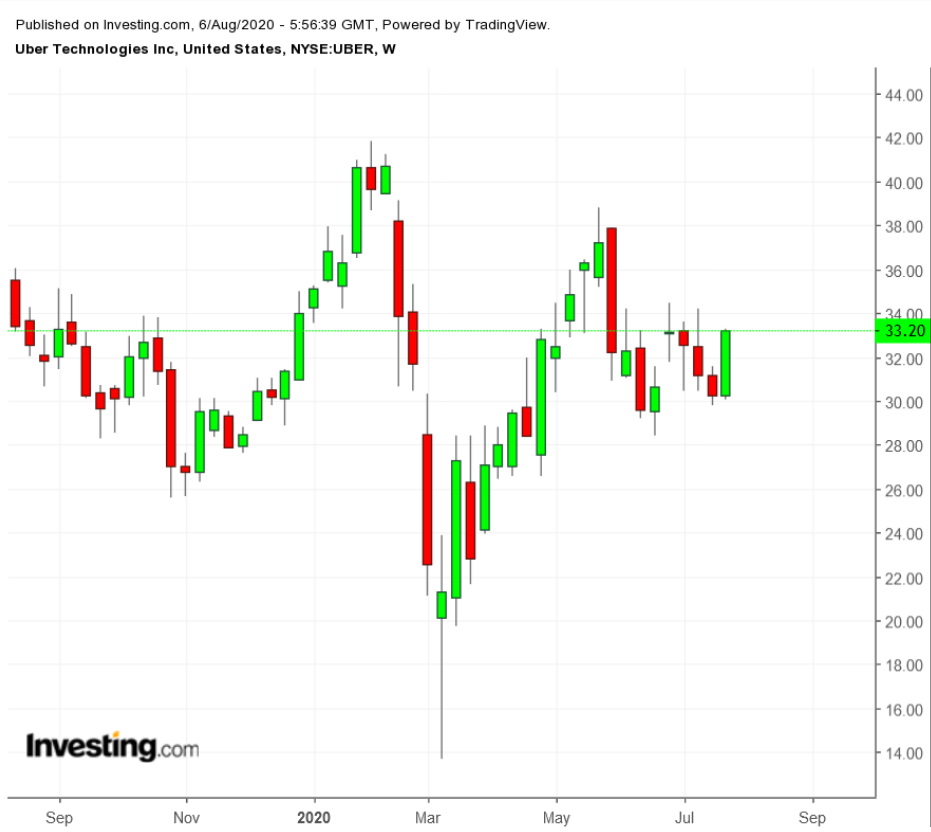- Reports Q2 2020 results on Thursday, Aug. 6, after the close
- Revenue expectation: $2.09 billion
- EPS expectation: -$0.8
Investors are putting a lot of faith in Uber Technologies (NYSE:UBER) these days. After the ride-hailing tech platform took a big hit from the pandemic-triggered slowdown in March, its shares are showing strength and signalling the worst is over for the world’s largest ride-hailing company.

Shares of the San Francisco-based company are up about 120% since the March 18 low. After recovering from the coronavirus-induced plunge, they’re now up 10% for the year, outperforming the benchmark S&P 500, which has gained 2% over the same period. They closed yesterday at $32.20.
On the face of it, there isn’t much to cheer about Uber’s business during this global health crisis. Its ride-hailing services came to a standstill globally as countries shut city after city in an effort to curb the spread of COVID-19, which has so far infected more than 18 million people worldwide.
But it is its diversified business model that is allowing Uber to weather this downturn better than other ride-hailing companies.
While the company’s ride-hailing business plunged during the first quarter, its food-delivery unit thrived as more people turned to ordering online during the pandemic. Gross bookings for Uber Eats surged to $4.68 billion in Q1 2020, an increase of 52% compared with the first quarter of the previous year.
Investors will be keenly monitoring the performance of this unit when the company reports its Q2 earnings today, especially when the pandemic is still spreading and keeping people in their homes.
Postmates Acquisition
During the quarter, Uber further strengthened its position in this highly competitive market when it announced the acquisition of Postmates, a California-based restaurant food delivery service, for $2.65 billion in an all-stock transaction.
Postmates is complementary to Uber Eats and has a strong relationships with small- and medium-sized restaurants, particularly local favorites that draw customers to the Postmates brand. Additionally, Postmates has been an early pioneer of “delivery-as-a-service,” which complements Uber’s growing efforts in the delivery of groceries, essentials and other goods.
According to a recent note by Oppenheimer, Uber’s hybrid rides/food structure has allowed drivers to be re-purposed during COVID-19 and keep more users engaged, potentially reducing marketing and promotion spending post pandemic.
Uber’s quick cost-cutting drive to deal with the pandemic drop in its ride-sharing service is another factor keeping investors calm during this crisis. Uber has announced a series of cost-trimming moves, including ending food delivery operations in more than half a dozen countries and cutting about a third of its workforce in its vehicle-for-hire service in the Middle East, known as Careem. In May, Uber announced it would lay off 14% of its staff.
Uber, which has never turned an adjusted quarterly profit—and is unlikely to do so this year—now expects to hit that milestone next year, thanks to its cost-saving measures that will eliminate more than $1 billion in expenses.
Bottom Line
Uber is among those new economy companies showing resilience in this recession. The company is producing meaningful gains in its Eats division and showing cost discipline during the crisis.
Today’s earnings report is likely to provide further evidence that the company is on the right track.
